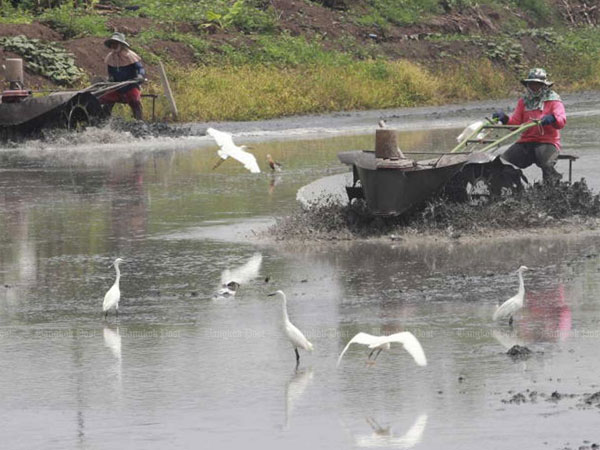 High investment costs, uncertain market positioning and the absence of a clear government policy are preventing Thai rice farmers from fully embracing sustainable practices, according to the Rice Exporters' Association.
High investment costs, uncertain market positioning and the absence of a clear government policy are preventing Thai rice farmers from fully embracing sustainable practices, according to the Rice Exporters' Association.
The association said that without firm state support for brand development and improving farming standards, Thailand's sustainable rice industry is losing ground to competitors.
"Strong political commitment -- demonstrated through leadership, funding, and effective policies -- is needed to improve yields and expand market access for sustainable rice," said Vallop Manathanya, the association's vice president, during a recent workshop on the national roadmap for the Integrated Sustainable Rice Landscapes (ISRL) project.
The project aims to improve policy frameworks, farmer training, and financing mechanisms, while preserving natural landscapes, ecosystems, and biodiversity.
Hundreds of farmers in Chiang Rai and Ubon Ratchathani provinces are participating in the project, with 50,000 tonnes of sustainable rice already exported. However, Mr Vallop noted that the product still lacks a strong brand identity and clear market positioning.
"It's hard to sell sustainable rice when it's priced higher than other varieties in such a competitive market," said Thanawat Lowharuangrongkul of the Thai Rice Millers' Association.
He noted past efforts to encourage farmers to plant fragrant pandan jasmine rice, saying that despite the rice's premium label due to its geographical indication status, farmers had issues selling it in the market, as the higher prices restricted sales.
Mr Thanawat added that millers remain unsure whether farmers can bear the cost of obtaining Sustainable Rice Platform (SRP) certification.
To help, the association, which represents 3,000 registered millers, is prepared to facilitate business matching to connect producers with buyers, he said.
"If farmers can make a profit and sustain their practices, the whole supply chain benefits," he said.
Chitnucha Buddhaboon, deputy director-general of the Rice Department, acknowledged the challenges and stressed the need for a systematic shift from traditional farming.
The department is finalising a national roadmap to lower production costs, cut hazardous chemical use, and adopt climate-smart technologies -- with the aim of increasing yields while reducing greenhouse gas emissions in line with national and global climate goals.














© Copyright 2025 The SSResource Media.
All rights reserved.